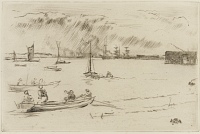Etchings Institutions search term: grolier club
Greenhithe | ||
| Number: | 173 | |
| Date: | 1877 | |
| Medium: | drypoint | |
| Size: | 151 x 227 mm | |
| Signed: | butterfly at lower right | |
| Inscribed: | no | |
| Set/Publication: | 'Cancelled Plates', 1879 | |
| No. of States: | 4 | |
| Known impressions: | 25 | |
| Catalogues: | K.165; M.161; W.135 | |
| Impressions taken from this plate (25) | ||
TECHNIQUE
This is a landscape drawn freely in drypoint, with some burnishing out and redrawing of individual ships, and the addition of patches of shading, particularly in the sky, in later states.
PRINTING
Most known impressions are from the cancelled set. However numbering on some records suggest that there were about ten printed before cancellation. Whistler appears to have numbered some of the proofs, for example:
The numbering may be a printing record or reflect plans for exhibitions or sales. Similar coded numbering sometimes occurred in his sales records, but these do not always match and are not always comprehensible. For instance in 1877 he sold Messrs Hogarth and C.A. Howell two impressions that obviously form part of a sequence, being described:
'Greenhithe - No. 8 ' ' x'.
'Greenhithe No. 9 x'. 12
'Greenhithe No. 9 x'. 12
It is possible this meant the eighth impression out of a group of ten, the asterisks (' ') meaning that two were left. The other note ('x') may indicate an impression specially selected for exhibition or a particular collector. Not all impressions of this etching have been located so it is still possible that evidence will emerge as to what was actually going on.
Early impressions were printed in black ink on laid paper. These include ivory paper with a De Erven De Blauw watermark ( ) and with Baslerstab watermark (
) and with Baslerstab watermark ( ); off-white paper with the Arms of Amsterdam watermark, the sheet removed from a book with sewing holes along the lower sheet edge (
); off-white paper with the Arms of Amsterdam watermark, the sheet removed from a book with sewing holes along the lower sheet edge ( ); buff 'antique' (pre-1800) laid paper removed from a book, with old writing on the verso, headed 'De Auctore', which appears to be an index or commentary on the writings of the Apostles; and finally one on plain ivory paper (
); buff 'antique' (pre-1800) laid paper removed from a book, with old writing on the verso, headed 'De Auctore', which appears to be an index or commentary on the writings of the Apostles; and finally one on plain ivory paper ( ). One of the later impressions is in dark brown ink on dark ivory laid paper with a partial 'HGH' watermark (
). One of the later impressions is in dark brown ink on dark ivory laid paper with a partial 'HGH' watermark ( ).
).
 ) and with Baslerstab watermark (
) and with Baslerstab watermark ( ); off-white paper with the Arms of Amsterdam watermark, the sheet removed from a book with sewing holes along the lower sheet edge (
); off-white paper with the Arms of Amsterdam watermark, the sheet removed from a book with sewing holes along the lower sheet edge ( ); buff 'antique' (pre-1800) laid paper removed from a book, with old writing on the verso, headed 'De Auctore', which appears to be an index or commentary on the writings of the Apostles; and finally one on plain ivory paper (
); buff 'antique' (pre-1800) laid paper removed from a book, with old writing on the verso, headed 'De Auctore', which appears to be an index or commentary on the writings of the Apostles; and finally one on plain ivory paper ( ). One of the later impressions is in dark brown ink on dark ivory laid paper with a partial 'HGH' watermark (
). One of the later impressions is in dark brown ink on dark ivory laid paper with a partial 'HGH' watermark ( ).
). It was published in an album of Cancelled Plates ('Cancelled Set') by The Fine Art Society in 1879. As many as 20 or 24 cancelled impressions may have been printed. All are printed in black ink, most on ivory or cream 'modern' (post-1800) laid Van Gelder paper ( ,
,  ,
,  ,
,  ); one on laid paper with a partial crown watermark (
); one on laid paper with a partial crown watermark ( ); and one on cream wove paper (
); and one on cream wove paper ( )
)
 ,
,  ,
,  ,
,  ); one on laid paper with a partial crown watermark (
); one on laid paper with a partial crown watermark ( ); and one on cream wove paper (
); and one on cream wove paper ( )
)
